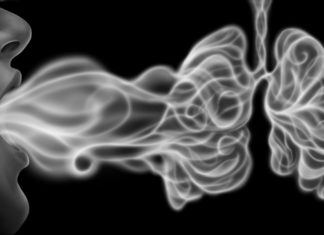
An article on the Radiology Business website discusses a study regarding the health of the lungs and using fMRI Lung scans to assess the effects of smoking and vaping.
The author of the study Sylvia Nyilas PhD of Bern University Hospital in Switzerland and colleagues sent 44 healthy adults for various lung tests.
Functional lung tests and Un-enhanced Lung fMRI’s (functional Magnetic Resonance Imaging) were performed to establish baseline results and to observe changes after the participants vaped or smoked.
Vapers numbered 13 of the 44, 12 were active (current) smokers, 9 were former smokers and 10 were neither vapers or smokers.
By the way I am no health professional – so I am sorry if my terminology is incorrect. I am just interpreting the study and reporting back.
fMRI Lung Scan Findings
Evaluating the imaging showed that current and past smokers showed signs of significant localised decrease in lung perfusion after smoking, compared to the baseline results.

Lung Perfusion records the blood supply through the lungs. A lower Lung Perfusion result means there is less blood circulating and could be as a result of damage, clots or disease.
A low lung perfusion can prevent the lungs delivering oxygen efficiently into the blood system. This can cause Hypoxemia (low blood oxygen) or Hypoxia (low oxygen in tissues or organs) which can cause irreparable damage in the short and long term.
However the nicotine vapers results showed that lung perfusion actually increased after vaping.

You can read the full study here – RSNA – MRI Shows Lung Perfusion Changes after Vaping and Smoking
